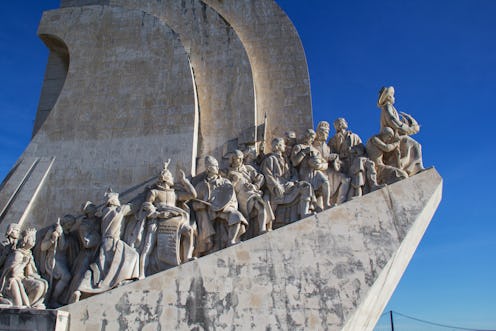Life
6 Myths About Columbus Day

Once again, Columbus Day is upon us, but what does it even mean? This poorly understood holiday has fallen on the second Monday in October since 1937, but it seems like most of our knowledge of Christopher Columbus ends with the children's rhyme "in fourteen hundred ninety-two, Columbus sailed the ocean blue." What is Columbus Day exactly, and what is it supposed to celebrate?
As it turns out, there are layers of complexity to Mr. Columbus and his holiday. It all started when Columbus (a.k.a. Cristoforo Colombo) was born in 1451 in Genoa, Italy. He began sailing as a teenager and basically never stopped, ending up in such far-flung places as Greece and Portugal on trading expeditions. Having amassed a bunch of nautical knowledge and experience, Columbus began asking higher-ups in various countries for their help on his ultimate voyage to discover what else was out there. Officials in Portugal and Italy rejected Columbus, but his plans intrigued Spain, who eventually gave him the go-ahead after they got done fighting some wars.
So Columbus and his men set off (with the Nina, the Pinta, and the Santa Maria, of course) from Spain in August 1492 on a mission to secure his legacy, as well as that of Catholic Spain. By October, they had reached the Caribbean, then continued to Cuba before crashing one of the ships on the island now known as Hispaniola, forming a settlement there, and just barely making it back to Portugal. Columbus made several subsequent voyages, but his reputation declined as the missions became less exploratory and more explicitly geared towards evangelization and colonization, which are difficult and dirty work.
Did you even know that much? I sure didn't. Myths about the man and his holiday abound, but we can set a few straight this year.
Myth #1: Christopher Columbus discovered America
Leif Erikson of Iceland was probably the first European to reach America, 500 years before Christopher Columbus. Not to mention all the other people who'd been in the Americas before, of course. Oops.
Myth #2: Columbus was the one to figure out that the Earth is round
According to History.com, "most educated Europeans in Columbus' day understood that the world was round, but they did not yet know that the Pacific Ocean existed." So while they underestimated how far Columbus would have to travel to get to the Indies, they did not think that he was literally in danger of sailing off the edge of the flat earth or something. It was clear that Columbus would be able, in principle, to sail west to reach the east.
Myth #3: Columbus was a great navigator
Columbus died still believing he had reached Asia. Though of course it was harder to navigate back in the day, without digital tools or satellite maps, this mistake is hard to overlook.
Myth #4: Columbus was a terrible navigator
At the same time, the urge to depict Columbus as a hapless goof who triumphantly claimed the wrong land isn't quite right, either. Columbus was one of the best navigators of his day in a more limited sense — he did a great job navigating with the tools he had at the time.
Myth #5: Columbus Day is uncontroversial, even though it celebrates some terrible history
Columbus Day has been controversial for a very long time, dating back to the 19th century. It was celebrated for the first time in 1892, one year after anti-Italian sentiments in America boiled over and led to a mass lynching in New Orleans. To his credit, President Benjamin Harrison was trying to inject some patriotism into Americans by encouraging them to recognize an exemplary Italian of the past.
In other words, the holiday was kind of cooked up to celebrate Italian-Americans in the first place, for social justice-related reasons of dissipating xenophobic sentiment. But more recently, the controversy has shifted towards drawing focus on the oppression towards indigenous people that followed Columbus to the "new" world. In general, though, Columbus day has been controversial since its birth.
Myth #6: You don't have to work on Columbus Day
Columbus Day is "one of the most inconsistently celebrated U.S. holidays," despite being a federal holiday. Fewer than half of U.S. states recognize Columbus Day as a paid holiday foremployees, and there are a smattering of state-level alternative holidays going on in October instead (like South Dakota's Native Americans Day and Hawaii's Discoverers' Day). Especially if you work for neither the federal nor state government, you're probably out of luck.
Image: bygimmy/Fotolia; Giphy (4)